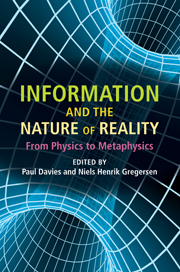Book contents
- Frontmatter
- Contents
- About the authors
- Acknowledgments
- 1 Introduction: does information matter?
- Part I History
- Part II Physics
- Part III Biology
- Part IV Philosophy and Theology
- 12 The sciences of complexity: a new theological resource?
- 13 God as the ultimate informational principle
- 14 Information, theology, and the universe
- 15 God, matter, and information: towards a Stoicizing Logos Christology
- 16 What is the ‘spiritual body’? On what may be regarded as ‘ultimate’ in the interrelation between God, matter, and information
- Index
- References
15 - God, matter, and information: towards a Stoicizing Logos Christology
from Part IV - Philosophy and Theology
Published online by Cambridge University Press: 06 December 2010
- Frontmatter
- Contents
- About the authors
- Acknowledgments
- 1 Introduction: does information matter?
- Part I History
- Part II Physics
- Part III Biology
- Part IV Philosophy and Theology
- 12 The sciences of complexity: a new theological resource?
- 13 God as the ultimate informational principle
- 14 Information, theology, and the universe
- 15 God, matter, and information: towards a Stoicizing Logos Christology
- 16 What is the ‘spiritual body’? On what may be regarded as ‘ultimate’ in the interrelation between God, matter, and information
- Index
- References
Summary
Up to modernity, the majority of Christian thinkers presupposed the world of creation to be composed of two parts: the material and the spiritual, existing alongside one another as independent yet interacting realms. In the traditional exegesis of Genesis 1, for example, the creation of light in Genesis 1:3 (“Let there be light”) was interpreted as a spiritual light for spiritual beings in a spiritual world (kosmos noētos), preceding the creation of the corporeal light of the sun in the empirical world (kosmos aisthētikos) in Genesis 1:14.
This two-stock universe lost its plausibility with the advent of classical physics in the seventeenth century, when nature came to be seen as a seamless unity. The scientific intuition of the oneness of the universe, however, was initially combined with a narrow interpretation of the nature of the material. As Isaac Newton (1642–1727) argued in his Opticks, matter is basically atomic: “solid, massy, hard, impenetrable, moveable particles”. According to Newton, these particles, formed in the beginning by God and held together by the mechanical laws of nature, serve the divine purpose of the universe while at the same time being embraced by God, who is ubiquitously at work ordering, shaping, and reshaping the universe. For Newton, mechanism and theism were two sides of the same coin. How else to explain the orderliness of the otherwise arraying particles?
- Type
- Chapter
- Information
- Information and the Nature of RealityFrom Physics to Metaphysics, pp. 319 - 348Publisher: Cambridge University PressPrint publication year: 2010
References
- 2
- Cited by

